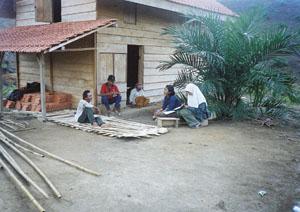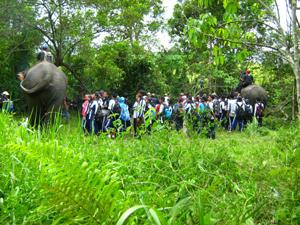Agung Nugroho
Other projects
11 Apr 2011
Bird Conservation & Education in Kerinci Seblat NP, Sumatra: Building Local Foundation to Address Increasingly Chronic Pressure on Bird Habitat & Population
This project aims to conserve elephants in Bengkulu, Sumatra, by increasing awareness within the local farming community about human-elephant conflict mitigation and of local policy makers about elephant conservation issues.

Desa mekarsari.
An estimated 2,440-3,354 wild elephants remain on Sumatra in highly fragmented populations across human-dominated landscapes where they must compete with humans for space and resources. This situation is epitomised by two elephant sub-populations (approximately 50 individuals in each) in Bengkulu province, southern Sumatra. These elephants currently reside outside of a protected area in close proximity to farmland, where they crop raid. This form of human-elephant conflict (HEC) reduces local tolerance for elephant conservation because it threatens local livelihoods.

Elephant conservation education.
Two main problems with elephant conservation in Bengkulu have been identified: i) local communities lack capacity to manage HEC; and, ii) local forestry department lacks reliable information on HEC and elephant conservation, which limits their ability to make enhanced conservation decisions.
The first issue began to be addressed in October 2006 with a small grant that aimed to empower local communities to protect their crops through strategies that were compatible with elephant conservation. However, in order to further protect elephants, and their natural habitats, both problems must also be addressed through raising awareness of HEC mitigation in local communities and awareness of the elephant conservation situation with local policy makers The Rufford project therefore has a strong focus on building and maintaining the local capacity to conserve elephants within Sumatra, which should, therefore, increase its sustainability beyond the lifespan of this project.
This project will focus on public awareness campaigns that will be conducted with local communities through outreach and local government policy makers through dissemination meetings to increase their knowledge and awareness about the situation of elephants in the field. All stakeholders will be engaged through regional media (newspapers and television). Changes in local attitudes to HEC mitigation and their preferred HEC strategies will be measured and monitored through field surveys. HEC strategies will be demonstrated throughout farmland bordering elephant habitat to promote HEC guarding strategies and empower communities to manage HEC themselves.
The anticipated project beneficiaries are:
i) local communities through raised awareness of HEC mitigation strategies and conservation issues;
ii) Indonesian Department of Forestry as recipients of detailed elephant and threat information and of well-trained forest rangers with enhanced skills;
iii) Indonesian universities through well-trained students able to conduct good scientific research that addresses important conservation issues;
iv) project staff through enhanced field training that can be applied to their conservation work.